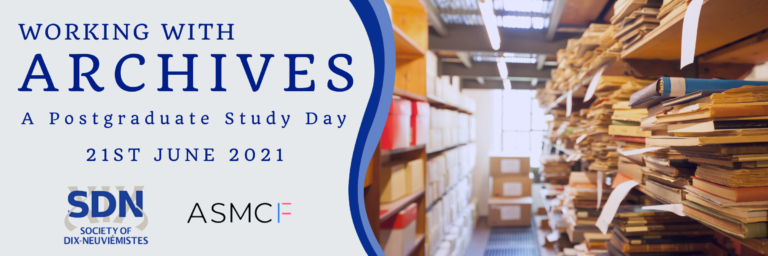Working with Archives PG Study Day

In June 2021, for the very first time, ASMCF and the Society of Dix-Neuviémistes (SDN) held a collaborative study day for postgraduates. Including reflections from an archival curator and an academic on their archival work, as well as five postgraduate panels and two flash presentations, the event was filled with rich and stimulating discussions. We were delighted to welcome delegates from across the UK and Ireland, France, Africa, USA and Australia; a number of auditors also participated throughout the day.
Following a warm welcome and introduction from the presidents of the respective societies, Chris Tinker and Jennifer Yee, we enjoyed an illuminating paper by Sophie Defrance, Curator of the Romance Collections in the British Library. Not only did Sophie illustrate the difficulties in delineating archives and printed sources, but she also pointed us to the abundant opportunities to pursue archival research in French in the British Library, sharing examples of both English and German collections that contain significant volumes of material in French. This theme was echoed in Kristina Åström’s flash presentation of her research on the relationship between painter James McNeill Whistler and writer Stéphane Mallarmé, which she works on from the Whistler archive in Glasgow.
The postgraduate-led panels dealt with themes as diverse as Filling the ‘Gaps’ in the Archive, Tools for Engaging with the Digital Archive, Preserving Forgotten Archives, Memory and Narrative in Archival Research and Problematising the Digital Archive. In all of these, we enjoyed lively discussions surrounding the issues facing archival researchers in 2021. We deeply appreciated the candour and intellectual rigour of our colleagues as they shared both the opportunities embraced and the challenges faced during their research. From a year in which we have all been restricted from attending the archives in person, it was an extremely worthwhile endeavour to reflect on the many possibilities afforded by online resources and digitised archives, whilst holding this in wary tension with the various pitfalls of such research. As we were reminded throughout the day, the importance of the archive’s materiality cannot be gainsaid. It was a joy to share in the excitement of bringing fresh attention to forgotten and neglected archives, contemplating how these can illuminate not just the past but the present.
Dr Hannah Scott brought us a passionate and engaging keynote entitled, ‘In Praise of Hoarding: Cultural History and the Archival Labyrinth’. Hannah’s honesty in sharing how archives had shaped and redirected her own fascinating research, leading to a range of exciting projects, pushed us to consider how we approach the archives. She reminded us of the essential qualities for the archival researcher: the humility to accept when our preconceptions might be wrong and to listen to what the archives are really saying; and the self-control to know when to set interesting material aside for another project. Her practical advice on how to avoid ‘the papery pit of despair’ encouraged us all! Hannah’s concluding thoughts brought us to consider how we ourselves create the archives of the future: not only do we explore and share archives, but we too must also be the archives we would like to find.
We want to extend our heartiest thanks to all our participants for a thoroughly beneficial and enjoyable day, and our best wishes for the continuation of their archival research. A particular thanks goes to our SDN colleagues, Dr Beatrice Fagan (Kent) and Jessica Rushton (Durham), for all their hard work – it was a pleasure to work with them, and we look forward to further collaborations and events.
Helen McKelvey (Queen’s University, Belfast)
